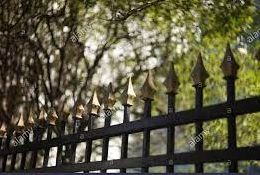
Around the corner from where I live a construction crew were busily putting up a new fence around the school. At first glance that seemed rather odd. There was a perfectly good fence around the school already. A closer look made clear what the problem was: the old fence was apparently not high enough. The new fence was at least half a meter higher. I figured that the education department was having trouble with people clambering over the existing fences and causing damage on school property. Well, the new two-metre high, spiked fence was bound to stop trespassers.
That led me to do some thinking. I recall that back in the late sixties and the seventies our family often spent a pleasant Sunday afternoon strolling through the grounds of the local primary school. The kids enjoyed playing on the school’s playground equipment. And we were not the only ones. There were often other families there also availing themselves of some lovely facilities that had been paid for by our taxation dollars. That almost provided us with a sense of entitlement. These school playgrounds were – in a sense – our playgrounds, paid for by our taxes. We had every right to be there.
But then things started to go wrong. In many places vandalism was beginning to happen in school grounds. Buildings were being broken into. It seems that some people not only felt entitled to use the school playground equipment but also to help themselves to the equipment in the science labs and in the school’s workshops. Instances of classrooms being set on fire became more common. Suddenly schools were being fenced off from the public and warning signs appeared that you could be charged with trespass if you climbed over the fence. Those fences became a sign of our deteriorating culture. We had become a society that could no longer be trusted to behave well on school playgrounds on a Sunday afternoon. The fences made clear to us all that just because our taxes paid for the playground equipment that didn’t give us the right to use it on weekends.
That makes those school fences a very telling commentary on the state of our society. More than that, it offers us insight into the relationship between the law and our behaviour. Think about it! Where people have respect for private property and are carful with what belongs to the community, fences may be helpful but are not really necessary. Where that respect and care are missing fences become essential and the greater the disrespect and carelessness the higher the fences need to be.
Let me put it another way. Fences are equivalent to the laws and regulations that limit our freedoms. The more we are prepared to discipline ourselves and demonstrate care and respect the less we need rules and regulations to restrict and limit us. The more undisciplined and unruly we become the more draconian the rules and regulations. Or, if you like, the fences need to be higher. The Covid-19 restrictions are a good case in point. Because many people can’t be trusted to do the right thing by social distancing and wearing face-masks the government imposes a lockdown. Because there are still those who want to get out and party, the lockdown becomes more draconian and now includes a curfew and police checks.
The point I’m making is that for the good of society we human beings need to learn self-control and self-discipline or else others will control and discipline us. But that’s just our problem, isn’t it? The rebelliousness of the human heart is hard to master and to discipline. That’s where you and I need Jesus to change and renew us to be the kind of disciplined people who will make a difference to the society in which they live.
John Westendorp
